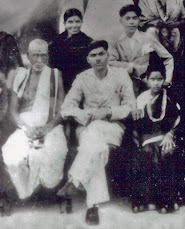‘I’
We have seen how the word ‘I’ refers to the native in occupation, rather than the body which he occupies as a ruthless tyrant.
The ‘Agent’ may have to use the word ‘I’ – but he must carefully be alert to know who it is that says ‘I’, otherwise the native smuggles himself in at every step and deceives the agent. This Native often pretends to worship and serve the Master – but the manner of his speaking and acting betray his intention:
Native’s ‘I’ uses words like the following:
- How I wish that things were like this or that and that would make me happy. If only.
- Oh, all this bother is not for my sake. I have no selfishness. It is for my children, or for the poor or for the country – you see if I save this money I can build a hospital.
- ‘I’ serve the Master faithfully and I await his grace. When his mercy is there and if the grace permits I shall get that.
- I am prepared to die for the Master or for something. Even if the Master kicks me, I shall continue to serve him and so on.
- Always there is an if.
- While pretending to serve the Master he denies his ever present existence and compassion and grace and knowledge.
- When he says ‘when I die’ he pretends to be very heroic – but actually it means he is willing to sacrifice his poor body and take the credit.
The agent’s I speaks and acts differently.
- There are no ifs and buts.
- The agent never acts and speaks as if the Master is deaf, dumb or blind and as if the Master is present and absent at certain times.
- If such words escape him, such as ‘when the grace permits’ - ‘If the grace permits’ – the agent should at once know who the ‘I’ is. It is the ‘I’ of the Native who is never at the listening post continuously. It is for this Native ‘I’ that the Master is sometimes present and sometimes absent. For the agent who is on constant attendance at the Master’s door the Master is always present and acting.
Also when the ‘I’ says – ‘if the Grace permits or when it sanctions’ – it means that it is the Native ‘I’ which has a particular personal desire in mind and is trying to hood wink the Master to put his signature absent-mindedly.
The agent can use the world ‘I’ if he remembers the pitfalls, the agent’s ‘I’ is the deathless spokesman of the Master and the only desire and work of this ‘I’ is to train his body to express joy, compassion and oneness under all conditions.
If by such acts many things collapse for the territorial transformation then it is as the Banyan tree and rock example – a by-product of natural harmonies.
It is the Native ‘I’ which says that something or other must be destroyed even for Divine work. The Banyan tree does not say that I shall split that rock and go out of its way to find water.










